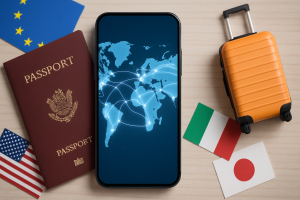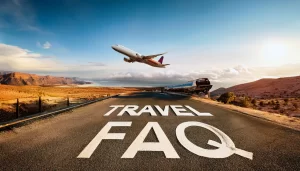Things to Do Before Traveling Abroad

Checklist of Things to Do Before Traveling Abroad 2025
Traveling abroad is both exciting and a special occasion that requires serious preparation.
Your trip is full of expectations, possibilities and dreams of discovery. Whether you are setting off for a vacation, education, business or long-term travel, there is much more to international travel than just packing a bag and booking a plane ticket.
- 1. Passport and Visa Preparation
- Check Your Passport Validity
- Renew If Necessary
- Visa Requirements
- Book Essential Travel Services
- Flights and Accommodations
- Transportation
- Health and Medical Preparations
- Visit a Travel Clinic
- Health Insurance
- Prescriptions and Medications
- Money and Finances
- Inform Your Bank
- Get a Travel-Friendly Card
- Currency Exchange
- Travel Insurance
- Documents and Paperwork
- Mobile and Internet Access
- International Roaming
- Communication Apps
- Safety and Security
- Register with Your Embassy
- Research Local Laws and Customs
- Emergency Numbers
- Luggage and Packing
- Pack Smart
- Carry-On Must-Haves
- Digital Readiness
- Backup Devices
- VPN and Privacy
- Learn the Basics of the Local Language
- Plan Your Itinerary
- Home Preparation
- Social and Cultural Etiquette
- Mental Preparation
Preparation is very important to ensure an unforgettable travel experience. This detailed guide we have prepared for you tells you everything you need to do before leaving your country. We have thought of everything for you, from paperwork to health precautions, from money matters to digital essentials.

1. Passport and Visa Preparation
Check Your Passport Validity
Your passport should be valid for at least 6 months beyond your travel date, even if your destination doesn’t require it. Many countries will deny entry or boarding if your passport is near expiry.
Renew If Necessary
Passport renewal can take weeks or even months, depending on where you live. Apply early to avoid delays.
Visa Requirements
Research the visa policy of your destination country:
- Tourist, student, work, or business visas—each has different documentation needs.
- Some countries allow visa-free travel or visa on arrival, but check for electronic travel authorizations (like ESTA for the U.S. or eTA for Canada).
💡 Tip: Visit official embassy websites or use visa checker tools like iVisa or Sherpa to get updated information.

Book Essential Travel Services
Flights and Accommodations
Book your international flights well in advance to get better rates. Compare across multiple platforms like Skyscanner, Google Flights, and Momondo.
Reserve accommodations based on your travel style—hotels, hostels, guesthouses, or short-term rentals. Use trusted platforms like:
- tatildegel.com
- Airbnb
- Hostelworld
Transportation
Will you need:
- Airport transfers?
- Train or bus passes?
- Rental car reservations?
Make arrangements ahead of time, especially if you’re arriving late or traveling in peak season.
Health and Medical Preparations
Visit a Travel Clinic
Schedule a visit at least 4–6 weeks before departure:
- Get country-specific vaccinations (e.g., Yellow Fever, Hepatitis A/B, Typhoid).
- Discuss malaria prevention or altitude sickness meds if applicable.
Health Insurance
Most domestic insurance policies don’t cover overseas treatment. Purchase travel medical insurance that includes:
- Emergency care
- Hospitalization
- Repatriation
- COVID-19 coverage
Compare plans on platforms like SafetyWing, World Nomads, or Allianz Travel.
Prescriptions and Medications
If you take prescription medication:
- Bring enough for your entire trip.
- Carry a doctor’s note and the original packaging.
- Check if your medications are legal in your destination country.
Money and Finances
Inform Your Bank
Let your bank know about your travel dates to avoid frozen cards due to suspicious foreign activity.
Get a Travel-Friendly Card
Avoid high foreign transaction fees with cards like:
- Revolut
- Wise (formerly TransferWise)
- Capital One Venture
These offer multi-currency accounts and ATM fee reimbursements.
Currency Exchange
Don’t exchange large amounts at airports. Instead:
- Order some local currency from your bank before traveling.
- Use local ATMs at your destination for better rates.
Travel Insurance
Travel insurance is not optional—it’s your safety net for the unexpected. Look for plans that include:
- Trip cancellation
- Lost luggage
- Flight delays
- Personal liability
- Adventure sports (if applicable)
A well-reviewed insurer can save you from financial loss during medical emergencies, cancellations, or even stolen belongings.
Documents and Paperwork
Create both physical and digital copies of important documents:
- Passport
- Visa
- Flight itinerary
- Hotel reservations
- Travel insurance policy
- Vaccine certificate
- Driver’s license / International Driving Permit
- Emergency contacts
Save them to a cloud storage service like Google Drive or Dropbox. Print at least one hard copy to keep in your carry-on.
Mobile and Internet Access
International Roaming
Check if your current mobile provider offers international plans. If not, consider:
- Buying a local SIM card upon arrival.
- Purchasing an eSIM from providers like Airalo or Holafly.
Communication Apps
Install essential communication tools:
- WhatsApp (widely used worldwide)
- Google Translate
- me or Google Maps (offline mode)
- Skype or Zoom for video calls
Safety and Security
Register with Your Embassy
Many governments allow you to register your trip with your embassy. In case of a natural disaster or political unrest, they can help locate or evacuate you.
Research Local Laws and Customs
Understand the social norms, laws, and taboos of your destination. Things that are normal in your home country may be illegal or offensive abroad.
Emergency Numbers
Know how to dial emergency services. Common ones include:
- 112 (Europe)
- 911 (USA/Canada)
- 000 (Australia)
Luggage and Packing
Pack Smart
Stick to the essentials and research climate and culture-appropriate attire. Include:
- Universal power adapter
- Reusable water bottle
- First-aid kit
- Compact umbrella or raincoat
- Travel-sized toiletries (within carry-on limits)
Carry-On Must-Haves
- Passport and documents
- Medications
- Headphones and chargers
- Snacks and a change of clothes
- Travel pillow and sleep mask (for long-haul flights)
Tip: Weigh your luggage before leaving home to avoid excess baggage fees.
Digital Readiness
Backup Devices
Ensure your devices are:
- Updated
- Backed up
- Protected with strong passwords and two-factor authentication
Download entertainment (music, shows, podcasts) ahead of time in case you don’t have Wi-Fi.
VPN and Privacy
Use a VPN service to protect your data and access websites safely, especially on public Wi-Fi networks.
Learn the Basics of the Local Language
You don’t need to be fluent, but knowing a few key phrases can make a big difference:
- Hello / Goodbye
- Please / Thank you
- Where is the bathroom?
- Help!
- I don’t speak [language]
Apps like Duolingo and Google Translate are great tools to get started.
Plan Your Itinerary
Create a rough itinerary with:
- Key attractions
- Transportation logistics
- Day trips
- Cultural experiences
Leave room for spontaneity—overplanning can lead to burnout. Use platforms like:
- Rome2Rio for transportation
- TripAdvisor for reviews
- Google My Maps to pin important locations
Home Preparation
Before you lock the door, make sure you:
- Unplug appliances
- Turn off water valves
- Arrange for pet or plant care
- Hold or forward mail
- Set timers for lights (for home security)
Ask a friend or neighbor to check on your home if you’ll be gone for an extended time.
Social and Cultural Etiquette
Before traveling, learn about:
- Tipping customs
- Dress codes for religious sites
- Body language cues
- Dining etiquette
Respecting cultural norms enhances your experience and prevents unintentional offense.
Mental Preparation
International travel can be thrilling, but also overwhelming. Stay open-minded and flexible. Prepare for:
- Jet lag
- Culture shock
- Language barriers
- Unexpected changes
Pack a positive attitude. It’s your most powerful travel tool.
Traveling abroad is one of life’s most rewarding experiences. With thorough preparation, you can minimize risks and maximize joy. Use this guide as your go-to checklist before you head off on your next global adventure.
Safe travels and bon voyage!





[…] Things to Do Before Traveling Abroad […]